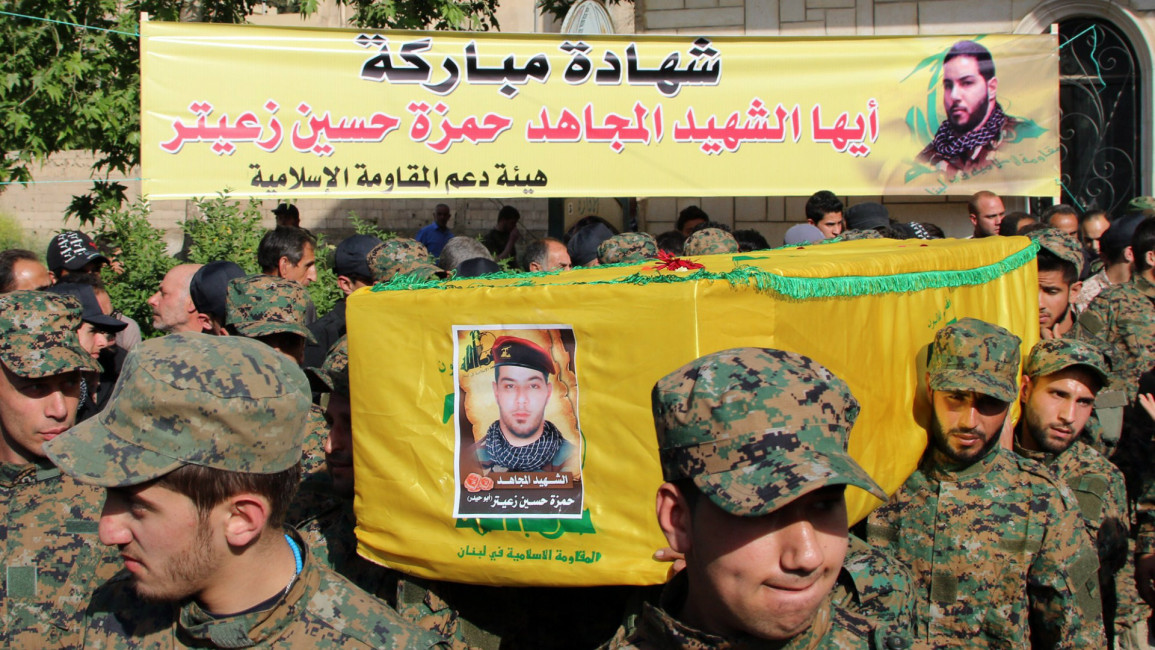Syrian rebels declare war on IS in Qalamoun mountains
Syrian rebels declare war on IS in Qalamoun mountains
Opposition forces in Syria open a new front against the Islamic State group while under attack from Hizballah and Syrian government forces.
4 min read
Hezbollah suffered losses from the Qalamoun offensive (Getty)
A coalition of rebel groups fighting the Syrian government forces and Hizballah in the Qalamoun mountains have announced they are going to "eradicate" the Islamic State group from the region.
The Jaysh al-Fatah collective of militias in Qalamoun was created some two weeks ago to coordinate battlefield efforts and the declaration of war on the Islamic State group (IS, formerly ISIS) opens another front in their struggle.
The Syrian government, with support from its Lebanese ally Hizballah, has been ratcheting up the pressure in the Qalamoun mountains in an effort to dislodge the rebel groups that have consolidated a fortified presence there over the past couple of years.
| Hizballah has not attacked the highlands controlled by IS. Instead, it has focused its attacks on areas where Jaysh al-Fatah is in control |
Jaysh al-Fatah is dominated by the al-Qaeda linked Nusra Front and other regional branches of the collective have realised major victories in recent weeks in parts of north and west Syria such as Idlib and Jisr al-Shugur.
al Araby al Jadeed has seen a scan of a hand written note dated May 6th with the stamp of local Nusra Front leader, Abu Malik, that appears to show an agreement allowing IS a presence in certain areas under the Nusra Front's control in the Qalamoun mountains.
That agreement has clearly collapsed and in Tuesday's statement IS is accused of a number of aggressions against the rebels, including the killing local leaders, ambushing convoys at checkpoints and forcing rebel groups to take roads that are expose them to bombardment from Hizballah and the Syrian air force.
Nusra Front and other opposition groups have fought bitter battles with IS in other parts of Syria but nonetheless the most recent declaration of war states that in the past such conflicts have been limited because of elements of IS that "show loyalty to all muslims".
The statement follows that these individuals have either been killed or exiled and now IS is dominated by "thiefs, bandits and those who are exploited for clothes and money".
Qalamoun media spokesperson Tayyim al-Qalamouni told al-Araby al-Jadeed that Hizballah was avoiding clashes with the Islamic State (IS) forces in the northern part of Western Qalamoun.
“So far, Hizballah has not attacked the Qarra highlands near Mount Halima, controlled by the IS. Instead, it has been focusing its attacks on mountain areas where Jaysh al-Fatah is in control, such as al-Jabba, Ras al-Maara, Assal al-War, al-Jarajir, Jabal Talaat Moussa and Falita,” he said.
Strategic heights
Control of the Qalamoun region is pivotal for the rebels, Hezbollah and the Syrian regime primarily because it allows the transportation of fighters and weapons to and from Lebanon.
Hezbollah relies on this to ensure its supply lines remain open from Syria, and by extension, Iran, while the Syrian regime is highly dependent on Hezbollah manpower and weaponry to bolster its forces around the country.
| After a series of major defeats both Hizballah and the Syrian government urgently want to retake the momentum |
As for the rebels they rely on the route for men and arms for the region iteself and further afield such as into the Damascus suburbs. If the rebels can dominate the moutains it also provides a potential route of attack into Hezbollah territory within Lebanon.
In response to preemtive strikes early last week Hizballah and regime forces have been launching a number of offensives to try and retake control of the strategic high points and transport routes within the mountains.
It is hard to confirm the details of exactly what is happening or how many fighters are being killed due to a lack of independent journalists on the ground and manipulation of the facts by the different sides.
However, it appears that Monday, Hizballah and the Syrian army pushed rebel fighters from Ras al Maara, a strategic hill that overlooks the Lebanese border and gives pro-regime forces access to other rebel strongholds in the area and control over a major rebel supply line that leads to the Damascus suburbs.
Pro-regime forces also seized the Ma’br al-Kharbah border crossing, effectively cutting off a rebel supply line that ran from the Damascus suburb town al Zabadani to the mountainous Qalamoun region.
With Jaysh al-Fatah sandwiched between Hizballah to the west and the Syrian armed forces to the South and East opening a new front of fighting with IS, which holds strategic points mainly to the north, reduces the rebel alliance's room for maneuver.
The Nusra Front led alliance of rebels have however enjoyed some successes in the early stages of the conflict, ironically using tactics used by their adversaries, Hizballah, when fighting Israel in southern Lebanon.
While coming under heavy artillery attack and air strikes the rebels have carried off a costly series of counter attacks by exploiting an intimate knowledge of the local terrain and a sophisticated network of caves, underground tunnels and trenches that they have developed in the area.
After a series of major defeats both Hizballah and the Syrian government urgently want to retake the momentum and score strategic victories.
They clearly have their sights on Qalamoun but considering the complexity of the mountain region and the knowledge and power of the rebels ensconced there it is likely to draw out into a draining battle of attrition.



